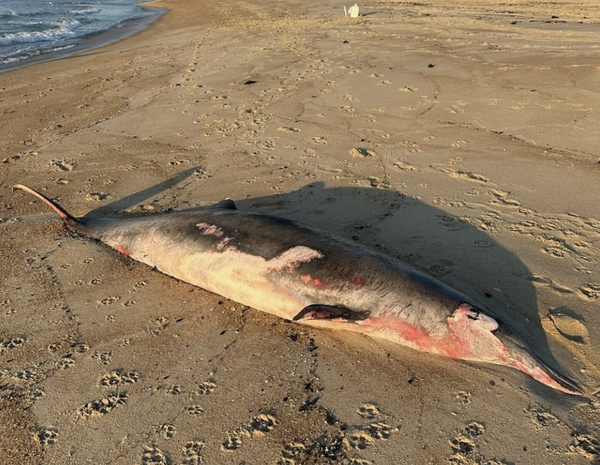A rarely seen species of beaked whale was found dead Thursday morning on a beach in Monmouth County, prompting an investigation into what led to the animal's death, wildlife officials said.
The 13-foot-long whale was spotted around 6 a.m. on the beach at St. Clair Avenue in Spring Lake, just south of Asbury Park. The Marine Mammal Stranding Center in Brigantine sent experts out to examine the whale, which was "moderately decomposed," the organization wrote on social media.
MORE: Honeybees can detect lung cancer by smelling a person's breath, research shows
The carcass was hauled away to a diagnostic lab in Trenton to undergo a necropsy that will aim to find a cause of death and identify the species.
On Thursday June 13th at 6:00am the Marine Mammal Stranding Center received a call for a deceased medium-sized cetacean...
Posted by Marine Mammal Stranding Center on Thursday, June 13, 2024
Beaked whales are part of a deep-sea dwelling group of cetaceans that have teeth and tend to live further offshore, spending little time near the surface. They are considered difficult to study for this reason, and their prevalence in oceans worldwide isn't well-known.
Since 1978, the Marine Mammal Stranding Center has responded to 19 beaked whales of four different species that have washed ashore during that span. Anatomical differences between the species are subtle, making it a challenge to identify beaked whales.
Although some groups have linked the deaths of marine species in recent years to work involved in offshore wind development, the National Oceanic and Atmospheric Administration has not found substantive evidence supporting such claims about wind surveying and construction activity. In many cases, necropsies have found that whales had injuries consistent with ship strikes and entanglement in fishing nets.
In March, New Jersey Gov. Phil Murphy (D) announced $3.7 million in funding for ecological research on offshore wind energy and whale behavior in the state's offshore wind lease areas.
New Jersey's ambitious plans to develop wind energy have faced hurdles tied to volatility in the industry. Last year, Danish wind energy developer scrapped two projects it had planned off the state's southern coast. State energy regulators have since approved two new wind projects that would be situated further offshore, maintaining the state's total of three planned turbine initiatives that officials say would power more than 2 million homes.
The Marine Mammal Stranding Center said it will publish the results of the necropsy on the beaked whale when they become available.

